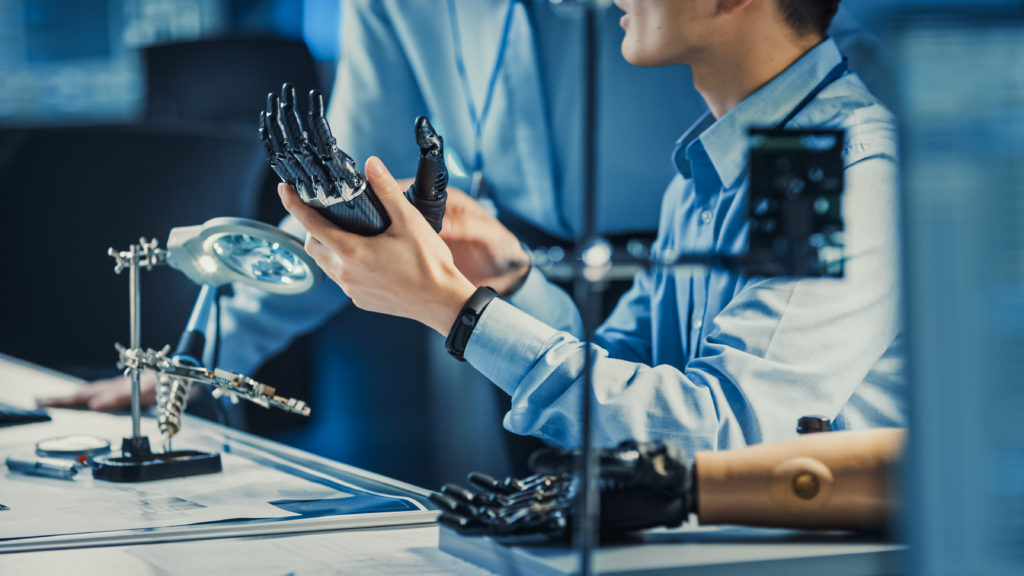As advancements are made in the medical industry, inventors of medical devices need to be aware of the importance of ensuring their intellectual property (IP) is adequately protected. Perhaps the best way to demonstrate why IP protection is essential is to examine the different types of IP protection and how they apply to medical devices, and what can happen when companies forgo the important first step of properly protecting their devices and processes for medical device IP.
What Are the Types of IP Protection and How Do They Apply to Medical Devices?
There are several basic types of IP protection, and each can play a role in the protection of medical device IP.
Patents
A patent grants property rights of an invention to an inventor. Utility and design patents are useful for medical device inventions. For example, a utility patent may be used to protect the actual function of the device, while the design patent may be used to protect the device’s exterior configuration.
By and large, the main focus of medical device IP is in the patent space. Most strategies for protecting medical device IP will include both utility and design applications. For example, one might imagine a new MRI machine includes many functional and ornamental aspects worthy of protection. A company will want to protect the software, new hardware, and other mechanical aspects of the machine. The company will also want to properly protect the design elements that make the particular machine “appealing to the eye.” For example, are the contours of the medical device IP worth protecting? How about the style of the MRI bed? As you can see, medical device IP protection requires a great degree of strategy.
Copyrights
A copyright is a form of protection given to “original works of authorship,” including architectural, cartographic, structural, and audiovisual creations. Copyrights protect the concrete expression of new ideas. For example, the software used in medical devices may be protected via copyright.
As medical device companies grow they may consider protecting specific packaging elements, brochure layouts, websites and app designs, and the like–all protected by copyrights.
Trade Secrets
Information that has economic value due to its secrecy may be considered a trade secret. Their secrecy is maintained mainly through contractual agreements. An example of a trade secret in medical devices could be a unique laser method used for different types of implants.
While no specific “trade secret filing” is made with the government, as we do with patents, it is critical that companies relying on trade secret protection form a concrete plan for separating and protecting those secrets from disclosure.
Trademark
A trademark can be a word, phrase, symbol, design, or a combination of these things that identifies a particular good or service. An example would be the actual name of the medical device or a slogan used to identify the device.
For many of our clients, especially those with a high customer satisfaction rating, trademarks are their most valuable assets. Because trademarks provide consumers an idea of quality based on prior experience, medical device companies having a history of high-quality products and services may greatly benefit from adequately protecting their brands, lines, products, and service offerings.
What Are the Impacts of a Lack of Medical IP Protection?
While a first-to-market approach works in some situations, it is often difficult in the medical space. Should a company or inventor decide to proceed to market without adequate protection, that company will find it difficult to stop others from copying the product or process once the market is proven. The “first to market” company may prevail in a patent infringement suit brought against it by a junior competitor, but invalidating a patent and continuing offering products is costly, labor-intensive, and difficult. As you can see, numerous difficulties may arise.
Interruption in Production
Litigation can cause an interruption in the production and sales of the medical device as a court may demand a defendant cease operations while the case is ongoing (known as an injunction). Time can be of the essence in manufacturing a new product, and time lost due to litigation cannot be regained. If litigation is necessary, it is preferred to be the party with the patents and having the leverage to file suit versus a potential defendant being accused of infringement and not having patents.
Damage to Public Image
It is likely that news of litigation will spread throughout the industry. For those holding the patents and bringing suit, it may be used to bolster their credibility and increase dominance in a particular market. On the other hand, a company accused of infringement may sustain reputational harm and questions from potential customers. Reputational harm is especially important for companies seeking to raise capital.
Damage to Professional Relationships
Investors, purchasers, and manufacturers may be wary of associating themselves with companies accused of infringing IP rights.
Business Lawyers Focusing on IP
Our team of attorneys at AdamsIP understands the importance of IP protection in the medical field and strives to create plans for our clients that incorporate IP as a business asset. We know our success depends on the success of our clients, and together we work to provide our clients with the protection they need. You may contact our firm via our contact page or by calling 1-251-289-9787.


